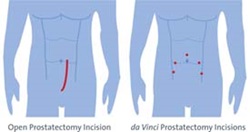Robotic Surgery for Prostate Cancer
Approximately 16 percent of American men will be diagnosed with prostate cancer during their lifetime. Prostate cancer develops when malignant cells form in the tissues of the prostate, a gland which is located just below the bladder and in front of the rectum in the male reproductive system.
Prostate cancer is the second-leading killer of men. However, thanks to public awareness and education, men are detecting prostate cancer earlier, which usually leads to a better prognosis and recovery. In addition, medical advances are allowing for better alternatives in the treatment of prostate cancer patients.
One of the treatment options for prostate cancer is a prostatectomy, the removal of the prostate gland, through a surgical procedure with the da Vinci® Robotic System. This option, for many patients who choose surgery to treat their prostate cancer, offers improved outcomes and reduced risks.
 Unmatched Precision and Control
Unmatched Precision and Control
The target site for a prostatectomy is surrounded by nerves affecting sexual function and urinary control. However, the da Vinci® Surgical System is so precise that surgeons can spare these nerves, enabling patients to maintain erectile function and continence, two major concerns for patients undergoing surgery.
Conventional surgery results in very high cancer cure rates, related to the pathologic extent of the disease and the surgical technique used. Prostatectomies performed through the da Vinci® Robotic System are proving to produce even higher cure rates than traditional surgery due to the system's precision and completeness of cancer removal.
Additional benefits of the da Vinci® System over traditional radical prostatectomies include:
- Less invasive procedure, resulting in less blood loss and risk of infection
- Smaller incisions and minimal scarring
- Less pain after surgery
- Shorter hospital stay (usually one night)
- Faster recovery
- Quicker return to normal activities
For more information about robotic surgery, please call (727) 462-3000.

